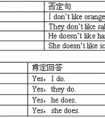用所给单词的正确形式补全句子。1. Thank you for_____ (talk)to us.2.We_____ (live)in a small house four years ago.3. Mrs Green has five _____(grandchild).4.-五年级英语
然后看主语的人称及复数形式:
一般过去时:
第一人称和第三人称的单数形式,则用was
第一人称和第二人称、第三人称的复数,则用were
一般现在时:
第一人称单数形式,用am
第三人称单数形式,用is
第一人称复数、第二人称、第三人称的复数形式,则用are
一般将来时:
will be
一般时态有关be动词的口诀:
我用am,你用are,is连接他/她/它,复数形式就用are
be动词的用法:
现在时 I am, you are, he is, we are, you are, they are
(缩略式 I'm, you're, he's, we're, you're, they're),
(否定缩略式 I'm not, isn't, aren't),
过去时 I was, you were, he was, we were, you were, they were
(过去时否定缩略式 wasn't, weren't),
过去分词been,现在分词being
英语的“be”是个特殊动词;有些语言,如马来文等,并没有“be”这样的动词。
“Be”除了原形的“be”之外,还有另外七种形式:
am, is, are, been, being, was, were.
在句子中,“be”可以是主动词(The Principal Verb)或助动词(The Auxiliary Verb)
一、口诀:
我用am,你用are,is连着他,她,它;
单数名词用is,复数名词全用are;
变疑问,往前提,句末问号某丢弃;
变否定,更容易,be后莫忘记;
疑问否定任你变,句首大写莫迟疑。
二、Be动词在一般过去时中的变化:
1、am和is在一般过去时中变为was;
2、are在一般过去时中变为were
3、带有was或were的句子,其否定、疑问的变化和am is are一样,即否定句在was或were后加 not,一般疑问句把was或were调到句首。
考点名称:一般过去时,动词过去式
一般过去时:
表示过去某个时间里发生的动作或状态;过去习惯性、经常性的动作、行为;过去主语所具备的能力和性格。
be动词在第一人称是单数和第三人称是单数是用was,其余用were。
a. 表示在过去时间里所发生的动作或存在的状态,常与表示过去的时间状语。
yesterday(昨天)、last week (上星期)、an hour ago(一小时前)等连用。
例:I went to the zoo with my father last Sunday. 上周日我和我爸爸去动物园了。
They weren't able to come because they were so busy.他太忙了,所以去不了。
b. 表示在过去一段时间里,经常性或习惯性的动作或状态。
例:My brother watched the World Cup every day last month.上个月哥哥每天都看世界杯比赛。- 一般过去时句法结构:
肯定形式
主语+动词过去式+其他
例句:She often came to help us in those days.
否定形式
①was/were+not;②在行为动词前加didn't,同时还原行为动词
例句:I didn't know you like coffee
一般疑问句
①Did+主语+do+其他? ②Was\Were+主语+表语?
例句:Did I do that?
用表格整理如下:肯定式 疑问式 否定式 疑问否定式 Iworked Did I work? I did not work Did I not work? He(She,It) worked Did he(she,it) work? He(she,it) did not work Did he(she,it) notwork? We worked Did we work? We did not work Did we not work? You worked Did you work? You did not work Did you not work? They worked Did they work? They did not work Did they not work?
结构句型:
1.一般句子
I watched TV last night.
2.一般疑问句
Did you watch TV last night?
3.there be 句型
There was an apple on the table last night.
Was there an apple on the table last night - 一般过去时用法口诀:
一般过去时并不难,过去动作、状态记心间。
动词要用过去式,时间状语句末站。
否定句很简单,didn't 站在动原前,其它部分不要变。
一般疑问句也好变,did放在句子前,主语、动原、其它部分依次站。
特殊疑问句也简单,疑问词加一般疑问句记心间。
最后一条请注意,动词过去式要牢记! - 过去式和过去分词的构成表:
不规则变化的动词过去式:词
构成
举例
一般情况
词尾+ed
动词原形
过去式和过去分词
look
talklooked
talked以不发音字母e结尾
词尾+d
like
arriveliked
arrived以“辅以字母+y”结尾
变y为i,再加ed
fly
studyflied
studied以重读闭音节结尾,且末尾只有一个辅音字母
双写词尾+ed
stop
planstopped
planned
have---had are---were get---got say---said feel---felt do/does---did is---was go---went drink--drank eat--ate bring----brought think----thought
buy----bought catch---- caught teach ---- taught sit----sat wear----wore cut----cut sweep----swept sleep——slept become----became
考点名称:一般将来时
一般将来时:
表示将来某个时间要发生的动作或存在的状态,也表示将来经常或反复发生的动作。
由“助动词will+动词原形”构成。“be going to+动词原形”结构是将来时的另一种形式,表示将要发生的事或者事先经过考虑打算去做某事。
例:We will go to Shanghai next year. 明年我们要去上海。
- 最新内容
- 相关内容
- 网友推荐
- 图文推荐
| [家长教育] 孩子为什么会和父母感情疏离? (2019-07-14) |
| [教师分享] 给远方姐姐的一封信 (2018-11-07) |
| [教师分享] 伸缩门 (2018-11-07) |
| [教师分享] 回家乡 (2018-11-07) |
| [教师分享] 是风味也是人间 (2018-11-07) |
| [教师分享] 一句格言的启示 (2018-11-07) |
| [教师分享] 无规矩不成方圆 (2018-11-07) |
| [教师分享] 第十届全国教育名家论坛有感(二) (2018-11-07) |
| [教师分享] 贪玩的小狗 (2018-11-07) |
| [教师分享] 未命名文章 (2018-11-07) |

![Does she like ____on weekends? [ ]A. going shoppingB. go shoppingC. go shop-六年级英语](http://www.00-edu.com/d/file/ks/4/1/55/2019-08-27/smalle6a92ee9e61a2aa039771cc65dedb40c1566919813.jpg)

![_____ is exercise.[ ]A. SwimmingB. SwamC. Swiming-六年级英语](http://www.00-edu.com/d/file/ks/4/1/55/2019-08-27/small40973c49a53101aac60eff6217bb35b51566919892.png)
![Myfavouriteschoolworkisbooks.[ ]A.readsB.readingC.read-四年级英语](http://www.00-edu.com/d/file/ks/4/1/55/2019-08-27/small8a67cf251e3192e64cc06a4ac60a96381566918811.png)
![The girl is very good at _____________. [ ]A. readB. readsC. writerD. writing-五年级英语](http://www.00-edu.com/d/file/ks/4/1/55/2019-08-27/smalla9ccf813980fe587df504d29b874bb8c1566919421.png)
